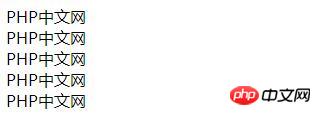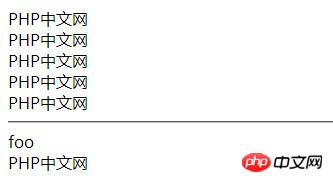 Backend Development
Backend Development
 PHP Tutorial
PHP Tutorial
 Detailed explanation of php class constant definition and examples
Detailed explanation of php class constant definition and examples
Detailed explanation of php class constant definition and examples
What are class constants?
In php, we can understand that a quantity whose value does not change is called a constant. So, what is a class constant? In fact, class constants are also easy to understand. We can call the value that always remains unchanged in the class a constant, and this constant can be called a class constant. Be sure to remember that you do not need to use the "$" symbol when defining and using constants.
Class constants belong to the class itself, not to object instances, and cannot be accessed through object instances
* Cannot be modified with public, protected, private, static
* Subclasses can be repeated To write constants in the parent class, you can call the constants in the parent class through (parent::)
* Since PHP5.3.0, you can use a variable to dynamically call the class. But the value of this variable cannot be a keyword (such as self, parent or static).
Definition of class constants
Class constants are defined using the const keyword:
const 常量名 = 常量值
Example
Define and use a class constant
<?php
header("content-type:text/html;charset=utf-8");
/**
* PHP类常量
*
* 类常量属于类自身,不属于对象实例,不能通过对象实例访问
* 不能用public,protected,private,static修饰
* 子类可以重写父类中的常量,可以通过(parent::)来调用父类中的常量
* 自PHP5.3.0起,可以用一个变量来动态调用类。但该变量的值不能为关键字(如self,parent或static)。
*/
class Foo
{
// 常量值只能是标量,string,bool,integer,float,null,可以用nowdoc结构来初始化常量
const BAR = 'PHP中文网';
public static function getConstantValue()
{
// 在类的内部可以用self或类名来访问自身的常量,外部需要用类名
return self::BAR;
}
public function getConstant()
{
return self::BAR;
}
}
$foo = 'Foo';
echo $foo::BAR, '<br />';
echo Foo::BAR, '<br />';
$obj = new Foo();
echo $obj->getConstant(), '<br />';
echo $obj->getConstantValue(), '<br />';
echo Foo::getConstantValue();
?>Code running result:

Result In the above example, we use the subclass to rewrite the parent class constant, the code is as follows :
<?php
header("content-type:text/html;charset=utf-8");
/**
* PHP类常量
*
* 类常量属于类自身,不属于对象实例,不能通过对象实例访问
* 不能用public,protected,private,static修饰
* 子类可以重写父类中的常量,可以通过(parent::)来调用父类中的常量
* 自PHP5.3.0起,可以用一个变量来动态调用类。但该变量的值不能为关键字(如self,parent或static)。
*/
class Foo
{
// 常量值只能是标量,string,bool,integer,float,null,可以用nowdoc结构来初始化常量
const BAR = 'PHP中文网';
public static function getConstantValue()
{
// 在类的内部可以用self或类名来访问自身的常量,外部需要用类名
return self::BAR;
}
public function getConstant()
{
return self::BAR;
}
}
$foo = 'Foo';
echo $foo::BAR, '<br />';
echo Foo::BAR, '<br />';
$obj = new Foo();
echo $obj->getConstant(), '<br />';
echo $obj->getConstantValue(), '<br />';
echo Foo::getConstantValue();
// 以上均输出PHP中文网
echo "<hr/>";
class Bar extends Foo
{
const BAR = 'foo'; // 重写父类常量
public static function getMyConstant()
{
return self::BAR;
}
public static function getParentConstant()
{
return parent::BAR;
}
}
echo Bar::getMyConstant(),'<br/>'; // foo
echo Bar::getParentConstant(); // PHP中文网
?>Code running results:

Recommended related articles:
Detailed explanation of the definition and usage examples of PHP constants
The above is the detailed content of Detailed explanation of php class constant definition and examples. For more information, please follow other related articles on the PHP Chinese website!

Hot AI Tools

Undresser.AI Undress
AI-powered app for creating realistic nude photos

AI Clothes Remover
Online AI tool for removing clothes from photos.

Undress AI Tool
Undress images for free

Clothoff.io
AI clothes remover

Video Face Swap
Swap faces in any video effortlessly with our completely free AI face swap tool!

Hot Article

Hot Tools

Notepad++7.3.1
Easy-to-use and free code editor

SublimeText3 Chinese version
Chinese version, very easy to use

Zend Studio 13.0.1
Powerful PHP integrated development environment

Dreamweaver CS6
Visual web development tools

SublimeText3 Mac version
God-level code editing software (SublimeText3)

Hot Topics
 1677
1677
 14
14
 1430
1430
 52
52
 1333
1333
 25
25
 1278
1278
 29
29
 1257
1257
 24
24
 PHP and Python: Different Paradigms Explained
Apr 18, 2025 am 12:26 AM
PHP and Python: Different Paradigms Explained
Apr 18, 2025 am 12:26 AM
PHP is mainly procedural programming, but also supports object-oriented programming (OOP); Python supports a variety of paradigms, including OOP, functional and procedural programming. PHP is suitable for web development, and Python is suitable for a variety of applications such as data analysis and machine learning.
 PHP's Purpose: Building Dynamic Websites
Apr 15, 2025 am 12:18 AM
PHP's Purpose: Building Dynamic Websites
Apr 15, 2025 am 12:18 AM
PHP is used to build dynamic websites, and its core functions include: 1. Generate dynamic content and generate web pages in real time by connecting with the database; 2. Process user interaction and form submissions, verify inputs and respond to operations; 3. Manage sessions and user authentication to provide a personalized experience; 4. Optimize performance and follow best practices to improve website efficiency and security.
 Choosing Between PHP and Python: A Guide
Apr 18, 2025 am 12:24 AM
Choosing Between PHP and Python: A Guide
Apr 18, 2025 am 12:24 AM
PHP is suitable for web development and rapid prototyping, and Python is suitable for data science and machine learning. 1.PHP is used for dynamic web development, with simple syntax and suitable for rapid development. 2. Python has concise syntax, is suitable for multiple fields, and has a strong library ecosystem.
 PHP and Python: A Deep Dive into Their History
Apr 18, 2025 am 12:25 AM
PHP and Python: A Deep Dive into Their History
Apr 18, 2025 am 12:25 AM
PHP originated in 1994 and was developed by RasmusLerdorf. It was originally used to track website visitors and gradually evolved into a server-side scripting language and was widely used in web development. Python was developed by Guidovan Rossum in the late 1980s and was first released in 1991. It emphasizes code readability and simplicity, and is suitable for scientific computing, data analysis and other fields.
 Why Use PHP? Advantages and Benefits Explained
Apr 16, 2025 am 12:16 AM
Why Use PHP? Advantages and Benefits Explained
Apr 16, 2025 am 12:16 AM
The core benefits of PHP include ease of learning, strong web development support, rich libraries and frameworks, high performance and scalability, cross-platform compatibility, and cost-effectiveness. 1) Easy to learn and use, suitable for beginners; 2) Good integration with web servers and supports multiple databases; 3) Have powerful frameworks such as Laravel; 4) High performance can be achieved through optimization; 5) Support multiple operating systems; 6) Open source to reduce development costs.
 PHP's Impact: Web Development and Beyond
Apr 18, 2025 am 12:10 AM
PHP's Impact: Web Development and Beyond
Apr 18, 2025 am 12:10 AM
PHPhassignificantlyimpactedwebdevelopmentandextendsbeyondit.1)ItpowersmajorplatformslikeWordPressandexcelsindatabaseinteractions.2)PHP'sadaptabilityallowsittoscaleforlargeapplicationsusingframeworkslikeLaravel.3)Beyondweb,PHPisusedincommand-linescrip
 PHP vs. Python: Use Cases and Applications
Apr 17, 2025 am 12:23 AM
PHP vs. Python: Use Cases and Applications
Apr 17, 2025 am 12:23 AM
PHP is suitable for web development and content management systems, and Python is suitable for data science, machine learning and automation scripts. 1.PHP performs well in building fast and scalable websites and applications and is commonly used in CMS such as WordPress. 2. Python has performed outstandingly in the fields of data science and machine learning, with rich libraries such as NumPy and TensorFlow.
 The Continued Use of PHP: Reasons for Its Endurance
Apr 19, 2025 am 12:23 AM
The Continued Use of PHP: Reasons for Its Endurance
Apr 19, 2025 am 12:23 AM
What’s still popular is the ease of use, flexibility and a strong ecosystem. 1) Ease of use and simple syntax make it the first choice for beginners. 2) Closely integrated with web development, excellent interaction with HTTP requests and database. 3) The huge ecosystem provides a wealth of tools and libraries. 4) Active community and open source nature adapts them to new needs and technology trends.



